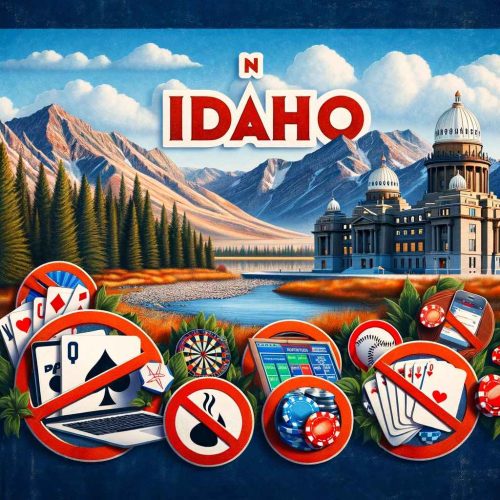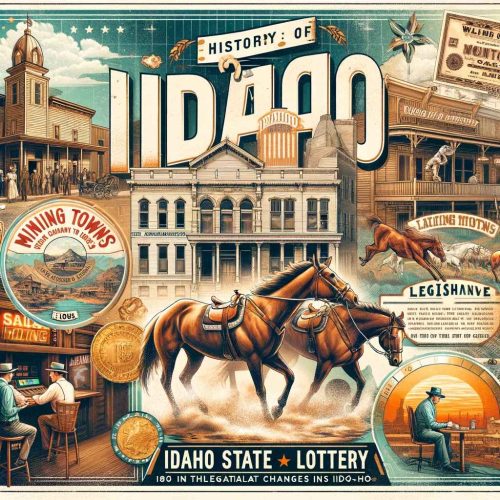Gambling Age in Idaho
Idaho has some of the strictest gambling laws in the United States, with most forms of gambling being illegal in the state. For the available exceptions, the legal gambling age in Idaho is 18. The Idaho Constitution, Article III, Section 20, prohibits gambling, except for a state lottery, pari-mutuel betting, and bingo and raffle games run by qualified charitable organizations.
Prohibited Forms of Gambling
Idaho law prohibits most types of gambling, including:
- Casinos
- Sports betting
- Online gambling
- Poker rooms
- Sweepstakes casinos

Prohibited Forms of Gambling in Idaho
Exceptions to Idaho’s Gambling Laws
Despite the general prohibition on gambling, there are a few exceptions:
Idaho State Lottery
The Idaho State Lottery was established in 1989 and offers various draw games and scratch-off tickets. The lottery is operated by the state and is one of the few legal forms of gambling in Idaho.
Tribal Casinos
Idaho has several Native American tribes that operate casinos on their reservations under the Indian Gaming Regulatory Act (IGRA). These casinos offer slot machines, poker, bingo, and other gaming options. The tribes have compacts with the state government that outline the terms and conditions of their gaming operations.
Charitable Gaming
Non-profit organizations can apply for licenses to conduct bingo and raffle games for fundraising purposes. These organizations must meet specific criteria and follow regulations set by the Idaho State Lottery Commission.
Pari-Mutuel Betting
Idaho allows pari-mutuel betting on horse races at licensed racetracks. Pari-mutuel betting is a system where all bets are pooled together, and payouts are calculated based on the total amount wagered and the number of winning bets.
Legal Gambling Age in Idaho
The legal gambling age for all forms of permitted gambling in Idaho is 18 years old. This includes the Idaho State Lottery, tribal casinos, charitable gaming, and pari-mutuel betting.
History of Gambling in Idaho

History of Gambling in Idaho
Gambling has been a part of Idaho’s history since the early days of settlement. In the late 1800s, mining towns like Silver City and Idaho City were known for their saloons and gambling halls. However, as the state grew and developed, attitudes towards gambling began to shift.
In 1953, the Idaho legislature passed a law banning all forms of gambling, except for pari-mutuel betting on horse races. This law remained in effect until 1988, when Idaho voters approved a constitutional amendment allowing a state lottery. The first Idaho State Lottery tickets were sold in 1989.
In the 1990s, several Native American tribes in Idaho began to establish casinos on their reservations, following the passage of the Indian Gaming Regulatory Act (IGRA) by the U.S. Congress in 1988.
Impact of Idaho’s Gambling Laws
Idaho’s strict gambling laws have limited the growth of the gambling industry in the state. While neighboring states like Nevada and Oregon have thriving casino industries, Idaho has remained largely casino-free, except for the tribal casinos on reservations.
The state’s prohibition on most forms of gambling has also led to the development of illegal gambling operations. In recent years, law enforcement agencies have cracked down on illegal gambling, including underground poker rooms and online gambling sites.
Conclusion
Idaho has some of the most restrictive gambling laws in the United States, with most forms of gambling being illegal in the state. The only exceptions are the Idaho State Lottery, tribal casinos, charitable gaming, and pari-mutuel betting on horse races. The legal gambling age for all permitted forms of gambling in Idaho is 18 years old.
While Idaho’s gambling laws have limited the growth of the gambling industry in the state, they have also helped to prevent the negative social and economic impacts associated with widespread gambling.
Martin Vatev's exploration into the world of words began not amid the pages of fictional tales but within the bustling, pragmatic environments of newsrooms and media outlets. As a student of Journalism at the Technical University of Dortmund, Martin was swiftly plunged into the ecosystems of stories that were urgent, real, and imperatively bound to the world's happenings. By taking part in different local media, his days were enveloped in uncovering facts, ensuring objectivity, and rendering narratives that adhered strictly to the pulses of reality.




